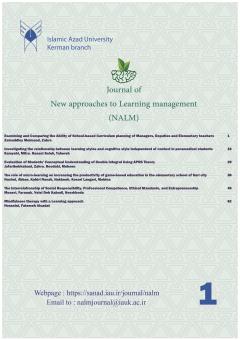The Interrelationship of Social Responsibility, Professional Competence, Ethical Standards, and Entrepreneurship Among Elementary School Teachers
Subject Areas : Educational Management
Faranak Mosavi
1
![]() ,
Norkhoda Veisi Dehkabodi
2
,
Norkhoda Veisi Dehkabodi
2
1 - Associate Professor, Department of Educational Management, Kermanshah Branch, Islamic Azad University, Kermanshah, Iran
2 - Master of Science, Department of Educational Management, Kermanshah Branch, Islamic Azad University, Kermanshah, Iran
Keywords: Social Responsibility, Professional Competence, Ethical Standards, Entrepreneurship,
Abstract :
Introduction: The aim of the present study was to investigate the relationship between social responsibility, professional competence, and ethical standards with the level of entrepreneurship among elementary school teachers in Kermanshah.
Methodology: This descriptive research utilized a correlational design. The statistical population consisted of approximately 283 elementary school teachers in the city, with the sample including 120 teachers selected through random sampling based on Morgan's formula. The instruments used in this study included Harrison Gaff's (1999) Social Responsibility Questionnaire, Etracht's (2002) Professional Competence Questionnaire, Rabiner's (2000) Ethical Standards Questionnaire, and the Entrepreneurial Behavior Questionnaire by Mogimi (1390).
Findings: The findings were analyzed using Pearson correlation coefficient and multiple regression methods. Results indicated a significant positive relationship between social responsibility and the level of entrepreneurship among teachers. Additionally, significant positive relationships were found between professional competence and the level of entrepreneurship, as well as between ethical standards and entrepreneurship. Furthermore, the variables of social responsibility, professional competence, and ethical standards were identified as predictors of teachers' entrepreneurship in that order.
Conclusion: Based on the findings of this study, it is essential to design educational programs focused on social responsibility for teachers. These programs should include workshops and continuous training that enhance teachers' professional and entrepreneurial skills. Moreover, creating collaborative environments between teachers and entrepreneurs can foster effective interactions and leverage practical experiences. The use of innovative teaching methods, such as simulation, will strengthen teachers' confidence and practical skills. Finally, continuous evaluation of these programs' impacts and the development of practical guides for entrepreneurship in education can lead to improved educational quality and positive outcomes within the educational community.
Aguinis, H., & Glavas, A. (2012). What we know and don’t know about corporate social responsibility: A meta
analysis and research agenda. *Journal of Management*, 38(4), 932-968.
Asgariyan, Mostafa. (2018). Organization and management of education, Tehran: Amir Kabir Publications.
[InPersian].
Brown, M. E., & Treviño, L. K. (2006). Ethical leadership: A review and future directions. *The Leadership
Quarterly*, 17(6), 595-616.
Darling-Hammond, L. (2017). *Teaching in the flat world: Learning from high-performing systems.* Teachers
College Press.
Fayolle, A., & Gailly, B. (2015). The impact of entrepreneurship education on entrepreneurial attitudes and
intention: A study of French students. *Journal of Small Business Management*, 53(1), 77-97.
Ghaibi, Masoumeh. (2019). The relationship between learning styles and entrepreneurship among undergraduate
students in different fields (Humanities, Engineering, and Basic Sciences) at Shahid Beheshti University. Master’s thesis, Faculty of Educational Sciences and Psychology, Management and Planning of Higher Education, Shahid Beheshti University, Tehran. [In Persian].
Hong, J. (2020). The role of entrepreneurial mindset and emotional intelligence in stress management.
*Entrepreneurship Theory and Practice*, 44(1), 18-36.
John, A. (2021). Understanding the role of ethical work climate on job satisfaction: A study on sales representatives.
*Journal of Business Ethics*, 168(4), 769-783.
Kazemi, Jahangir. (2020). Examining the relationship between social responsibility and entrepreneurship of
employees, Management Culture Quarterly, Volume 3, Issue 10, pp. 129-149. [In Persian].
Kuratko, D. F. (2016). *Entrepreneurship: Theory, process, and practice.* Cengage Learning.
Lovat, T. (2017). *Values education and quality teaching: A new model for teacher education.* Springer.
Meyer, J. W. (2020). The role of social responsibility in education: A reappraisal. Educational Review, 72(3), 261-276.
Mohseni, Kivan, Aqaie, Najaf, Pour Soltani Zarandi, Hossein, Ghorbani, Mehdi. (2018). The relationship between
perceived organizational justice and job burnout and turnover intention of employees in the General Directorate of Sports and Youth of Tehran Province, Quarterly Journal of Research in Sports Management and Motor Behavior, Volume 4, Issue 7. [In Persian].
Nasr Esfahani, Narges; Etemadi, Ahmad. (2018). The relationship between personality traits, job competence,
and quality of life in students of Allameh Tabatabai University, Research and Health. Issue 2, Volume 2. [In Persian].
Naseri Mohsen. (2018). Organizational justice and its types, Tehran: Samt Publications. [In Persian].
Robinson, S. P. (2021). Exploring ethical behavior: The ultimate challenge in the realm of human dignity.
*Journal of Business Ethics*, 174(1), 1-12.
Shaw, J. D. (2020). The impact of leadership and ethical culture on employee behavior. *Journal of
Organizational Behavior*, 41(5), 447-466.
Safari, Akram & Reza Sabouri. (2019). Examining the impact of managerial competence on increasing the
quality of working life of education staff in Tehran, International Conference on Management in the 21st Century, Tehran, Idea Makers Institute of the Capital. [In Persian].
Torkaman, Farakh, Abadi, Seyedeh Marzieh. (2019). Identifying factors affecting job satisfaction of teachers in
Fars Province, Educational Research Journal, Volume 5, Issue 5. [In Persian].


